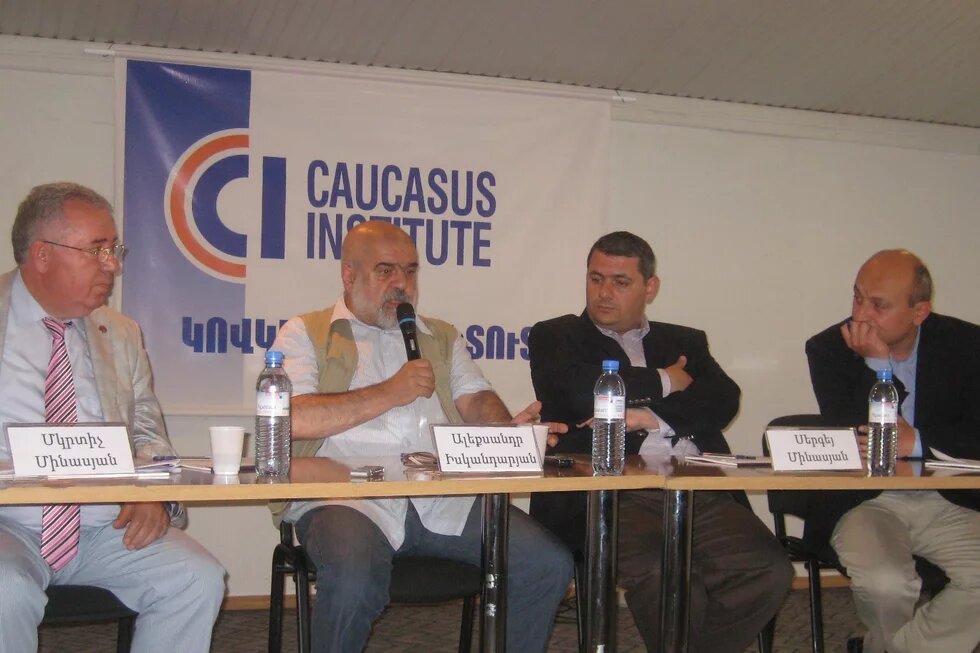
The first speaker of the event was Mkrtich Minasyan, MP representing the ruling Republican Party. Mr. Minasyan began his presentation by listing the three most important elections held in the period from May 2012 to May 2013: Parliamentary Elections on 6 May, 2012; Presidential Elections on 18 February, 2013 and Yerevan Municipality Elections on 5 May, 2013. In all three elections, the Republican Party won a landslide victory; the assessments of the elections by both international and local observers were generally positive. Comparing these elections with previous ones, the observers described them as more democratic and fair. Furthermore, Mr. Minasyan noted that the number of women and youth in the National Assembly of Armenia increased dramatically after the last Parliamentary Elections. Positive dynamics were registered at the Presidential Elections as well since all the parties had an opportunity of equal representation at the polling stations and complaints were met. Minasyan stressed that even if all of the demands of Heritage Party to recalculate votes in some polling stations had been met and 100% of votes from these polling stations would have gone to Raffi Hovhannisyan (Heritage’s candidate), election results would have remained unchanged. Thus, the victory of Serzh Sargsyan is not debatable. Minasyan also spoke about the decrease of Mr. Hovhannisyan’s rankings in the municipal elections during which he got almost 4 times fewer votes than during the Presidential Elections. Minasyan explained this by the fact that several opposition parties did not nominate candidates for the Presidential Elections and Raffi Hovannisyan got all their votes. In Yerevan Municipality Elections, all the major parties took part, and the layout was restored to normal. At the end of his speech, Mkrtich Minasyan stressed the willingness of the Republican Party to continue enhancing the quality of future elections in Armenia.
Secretary General of Heritage Party Stepan Safaryan was the second to speak at the debates. In contrast to his colleague, Safaryan thought that there were four crucial rounds of elections during the last year, adding to the list the Local Government Elections that took place in September 2012. According to Safaryan, the results of these elections, unfortunately, did not bring about any changes. The Republican Party simply used state resources to strengthen its positions. One of the few changes voiced by Safaryan was a “swap” between the Republican and Prosperous Armenia parties. In Safaryan’s opinion, the cities of Gyumri and Ijevan were “handed over” to the latter. He also disagreed with Mkrtich Minasyan’s viewpoint, saying that recalculation of the votes might have seriously affected the elections’ results. Safaryan also spoke of the Armenian Electoral Code, saying that it does not ensure separation between the state and the ruling party. In Safaryan’s opinion holding descent and fair elections with such an Electoral Code does not seem possible. At the end of his speech Stepan Safaryan expressed his doubts that one cannot expect political change from a party that is not willing to change itself.
The last speaker was Alexander Iskandaryan. On a whole Mr. Iskandaryan agreed with previous speakers highlighting that each of them is right in his own way. It is true that the elections were held on an acceptable level and it is also true that administrative resources were used by the ruling party. However, Iskandayan did not share Mr. Safaryan conviction that the elections changed nothing. In Iskandaryan’s opinion, the fact that the Republican Party has now gained power at every level represents a serious change in the political life of Armenia. He qualified this as a very negative phenomenon. According to Iskandaryan, two main conclusions can be made from the elections. First of all, all four rounds have shown that ideologies lose while technologies win. Election results prove that the Armenian electorate is not interested in ideology as such and does not wish to vote in accordance with it. Voters’ choices are becoming less emotional. Iskandaryan also mentioned that the crisis of ideologies is a worldwide trend and Armenia in this sense is no exception. The second conclusion made by Iskandaryan is that all the political forces of Armenia (at least, more or less significant ones) are now represented in the Parliament. He also spoke about the opposition, stressing that it lies in ruins; it can even be said that Armenia does not have a political opposition. Consequently, he believes that the goal of Armenian society is not the consolidation of the opposition, as the media claims, but rather its creation.
How Armenia can create an opposition was one of the issues that were discussed at length by guests and speakers. The opinion was voiced that the main precondition for creating a political opposition is the establishment of a functional political party system in the country, in which political parties do not work from election to election but on a daily basis, and their structure complies with the requirements to a political party, not a thematic club. A lot of criticism of the Republican Party was voiced. In the opinion of many participants, the Republicans do not wish to make a genuine effort to implement reforms and bring about changes that would affect ordinary citizens. Some participants voiced fears of possible social unrest caused by the increase of gas and electricity prices. It was also pointed out that the two political speakers’ rhetoric was extremely generalized, and both avoided discussing specific issues – the situation corresponding with the overall style of the election campaign by parties and candidates. Another observation was the Republican Party’s frequent use of the phrase "political tolerance" to describe what some participants think is a political apathy of the society. However, Mkrtich Minasyan disagreed, interpreting the word ‘tolerance’ in its literal sense.